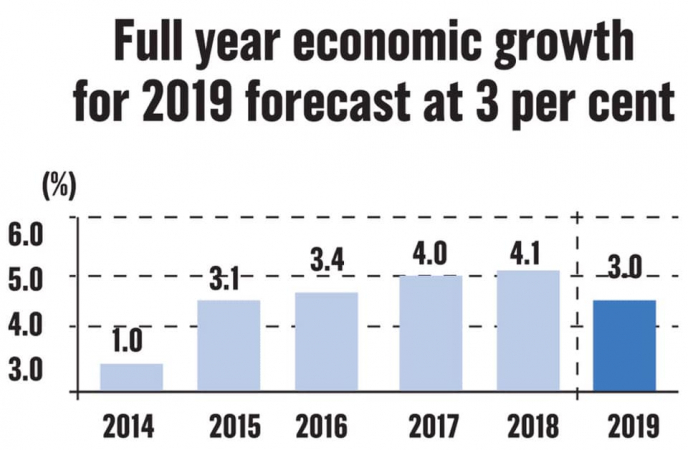Thailand: Encouraging signs emerge amid high economic risks: NESDC
“It is not crisis, the economy is still expanding ,” secretary general of the NESDC Thosaporn Sirisumphand, told a press conference yesterday.
Contraction of exports, lower growth in foreign tourist arrivals, weakening private investment and delay of budget disbursement all attributed to the lower growth in the second quarter, according to the state think tank.
The NESDC has revised downward its projection of this year’s economic growth to 3 per cent, or to a range of between 2.7-3.2 per cent, compared to an earlier estimate of 3.3-3.8 per cent.
Key assumptions have also been changed to reflect latest economic condition globally and domestically, according to the NESDC.
Export values in dollar term this year is expected to contract by 1.2 per cent following a contraction of 4 per cent and 4.1 per cent in the first and second quarter from the impact of the ongoing trade war between the United States and China, said deputy secretary general Wichayayuth Boonchit.
Previously, the NESDC forecast export growth at 2.2 per cent for 2019.
The four-per cent contraction of exports in the first half of the year had largely weakened the economy, he said.
Meanwhile, private investment expanded at a slow pace of 3.7 per cent from an earlier estimate of 4.5 per cent. The export contraction led to slower capacity utilisation, affecting private investment.
Public investment is expected to slow to 4 per cent from the previous estimation of 4.5 per cent, largely due to the delay in the formation of the new government after the May election.
The NESDC, however, was optimistic about household consumption, keeping its previous forecast of 4.2 per cent. Public consumption is also predicted to stay at its previous estimate of 2.2 per cent as government spending to support lower income groups would in turn support household consumption.
The number of Chinese tourist arrivals has yet to recover from the 8.8 per cent contraction in the third quarter of last year . Chinese tourist arrivals in the fourth quarter last year, first quarter and second quarter this year decreased by 10 per cent, 1.7 per cent and 8.2 per cent respectively.
Slower growth of Chinese economy and weakening of yuan currency were the major causes, he said.
“The NESDC miscalculated that more Chinese would have visited Thailand due its proximity, but instead they travelled to neighbouring countries such as Japan, South Korea, Taiwan, Hong Kong and Macau,” Wichayayuth said.
Major risks are on horizontal.
The euro-zone economy may lead the world into recession as Germany suffered economic contraction of 0.1 per cent in the second quarter, Italy zero per cent and a flat growth of 0.2 per cent in France.
The International Monetary Fund has revised its global growth projection to 3.3 per cent from 3.6 per cent and it could be lower if euro-zone economies face a sharper downturn, it warned. World trade growth is expected to slow to 3.4 per cent from 3.6 per cent estimated previously.
The euro zone could also face trade restriction on car and parts exports to US while Italy may see political problems. And if Britain ended up with a no-deal Brexit, it would multiply economic problems for the region, he warned.
The Chinese economy is sensitive to capital outflows while slower growth and weakening yuan currency have worried consumers and investors.
In Japan, the economy remains on an expansion trajectory. But if the US imposes trade restriction on Japanese autos, it could have an impact. Moreover, Japan plans to increase consumption tax rate later this year.
The impact of drought on the Thai economy is a serious issue as fresh water reserve remains at a lower level of 13 billion cubic metres as of August 15.
However, there are some encouraging signs which could cushion the weakening economy, he said.
Due to trade diversion, investors have started to relocate their factories out of China and importers are seeking imports from new sources, in fear of high tariff rates imposed by the US government omn Chinese imports.
“Judging by more applications for BOI tax privileges in the second quarter, we expect a rise in new investment in Thailand in line with a 8-9 per cent expansion of factory construction this year,” said Wichayayuth.
Prices of some farm products have risen, including Hom Mali fragrant rice, pork, meat and durian. The price index of farm product in the second quarter turned to positive for the first time in nine quarters, suggesting a rise in farmers’ income, he said.
The government stimulus package, to be approved by the Cabinet today (August 20), will also help boost the Thai economy. Moreover, the new government is expected to accelerate public investment in the rest of the year, he added.
Meanwhile, Don Nakornthab, senior director of economic and policy department at Bank of Thailand said the central bank cut policy rate in the latest meeting of Monetary Policy Committee to 1.5 per cent due to slower economic growth.
Looking forward, the Thai economy faces several risk factors including further impact from the US-China trade war, uncertainty of central bank policies in many countries and consistency of budget disbursement and economic policies implemented by the Thai government, he added.
Kasikorn Research Centre told the government to look at the labour market, saying that should external factors deteriorate it would further impact Thai exports, sending a wave of repercussion on the labour market and private consumption.
The research house maintains its growth projection at 3.1 per cent, but warned of risks which could lead to a range of 2.9-3.3 per cent.
It also said the stronger baht in the second quarter had eroded competitiveness of Thai exports, especially industries depending on input of local raw materials such as processed farm products.
Source: https://www.nationthailand.com/business/30375009


 English
English




